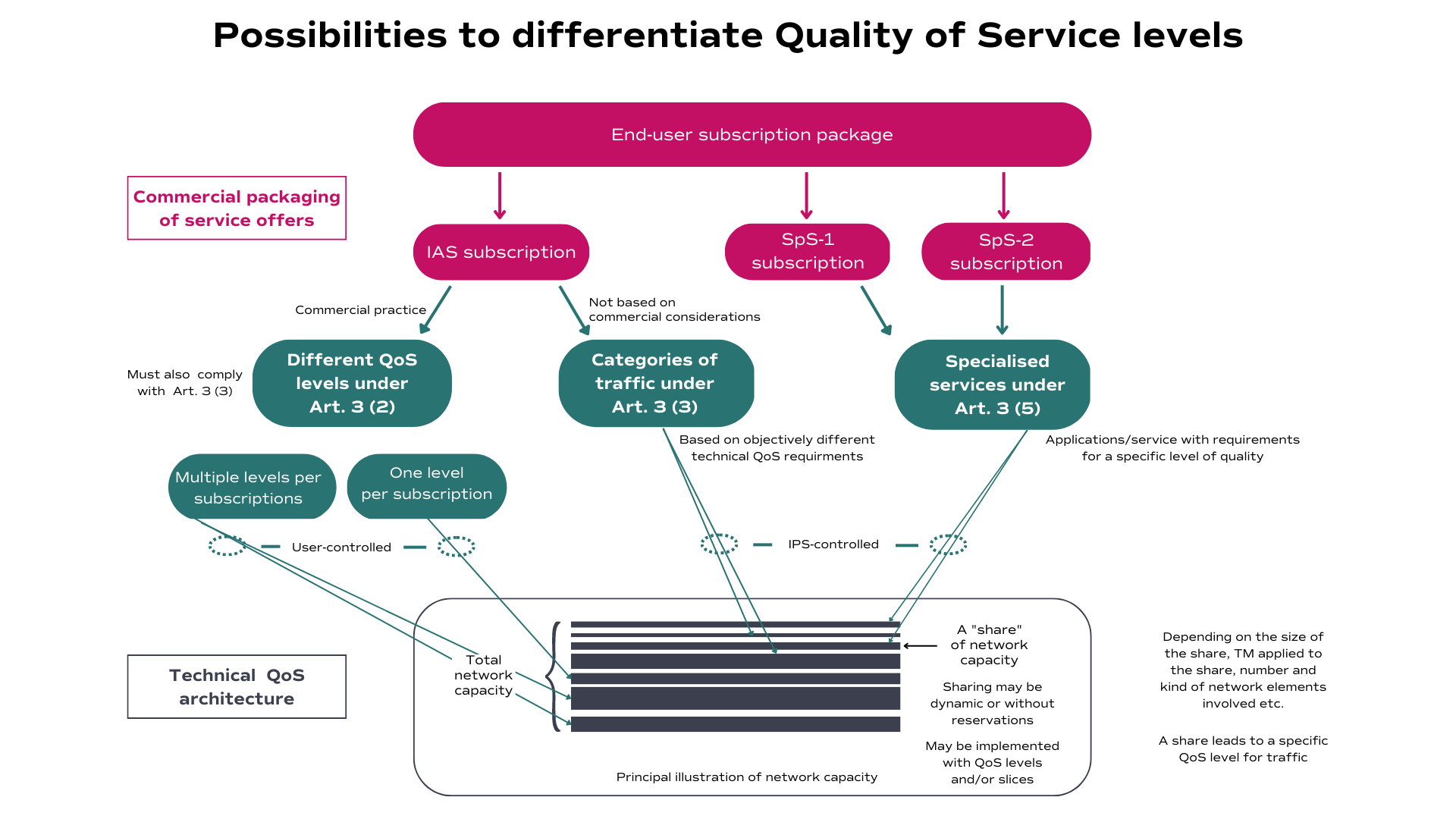Traffic Management
What is traffic management and what is ‘equal treatment’?
When end-users communicate via an Internet Access Service (IAS), data traffic is sent between the end-users’ terminals. The traffic is sent through the networks of the Internet Service Providers (ISPs) through which the end-users connect to the internet, as well as any intermediate networks. The way the traffic is forwarded in the networks is referred to as ‘traffic management’, which may include both regular first-come-first-serve management of traffic and more advanced ways of shuffling traffic through the networks.

When traffic is forwarded on a ‘first-come-first-served’ basis, this can be referred to as ‘equal treatment’. As the Body of European Regulators for Electronic Communications (BEREC) Guidelines on the implementation of the Open Internet Regulation – ‘BEREC Open Internet Guidelines’ - explain, this does not necessarily imply that all end-users will experience exactly the same performance. But as long as any treatment of traffic is done independently of applications and end users, the traffic is normally considered to be treated equally. Thus, the Regulation (EU) 2015/2120 of the European Parliament and of the Council of 25 November 2015 laying down measures concerning open internet access – the ‘Open Internet Regulation’ – and the BEREC Open Internet Guidelines seek to preserve the end-to-end principle of the internet.
What traffic management is allowed under the Open Internet Regulation?
In the first place, the Open Internet Regulation allows offering internet access subscriptions with different Quality of Service (QoS) levels regarding parameters such as speed, latency, jitter and packet loss. It is also possible to offer multiple application-agnostic QoS levels at the same time for a single subscription. These measures may not degrade the quality of other IAS subscriptions to a quality below the contract conditions.
The graph below schematically illustrates possibilities to differentiate QoS levels:

The figure illustrates that the commercial packaging of service offers can consist of subscriptions of an IAS supplemented with one or more Specialised Service (SpS). Regarding the IAS subscription, this may be provided in different ways based on QoS levels under Article 3(2) of the Open Internet Regulation or categories of traffic under Article 3(3) of the Open Internet Regulation, or possibly a combination of the two. Regarding the QoS levels, there may be one or multiple levels per IAS subscription.
As illustrated in the figure above, the QoS levels under Article 3(2) of the Open Internet Regulation are user-controlled. In case an ISP implements such QoS levels, they are provided according to the QoS parameters agreed in the contract with the end-user, but the end-user is in full control of selecting which application uses which QoS level.
On the other hand, the provision of categories of traffic under Article 3(3) of the Open Internet Regulation and the provision of SpS under Article 3(5) of the Open Internet Regulation, are both ISP-controlled. Regarding categories of traffic, as Article 3(3) second subparagraph of the Open Internet Regulation states, where an ISP implements these, they must be based on objectively different technical QoS requirements and cannot be based on commercial considerations. Regarding SpS, as Article 3(5) of the Open Internet Regulation explains, they are provided if this is objectively necessary in order to meet requirements for a specific level of quality.
As a third step, the Open Internet Regulation describes three specific exceptions which are allowed under stricter conditions. These exceptions are:
- compliance with other laws;
- preservation of integrity and security;
- congestion management measures.
Below, further details regarding the regulatory assessment of traffic management under these second and third steps are described.
How will regulators assess whether traffic management measures should be considered ‘reasonable’?
In order to be considered to be ‘reasonable’, traffic management would have to be based on objectively different technical QoS requirements of specific categories of traffic. The National Regulatory Authorities (NRAs) could ask ISPs about their use of traffic categories, such as which categories they implement; which QoS requirements they apply to each category; and which data packets are handled by each category. Based on the responses, the NRAs could assess whether the traffic management practice in question complies with the requirements of the Open Internet Regulation, specifically the second subparagraph of Article 3(3).
BEREC considers that categories of traffic could be defined, for example, by reference to application layer protocol or generic application type, but only insofar as:
- this requires objectively different technical QoS;
- applications with equivalent requirements are handled in the same category; and
- the justification given is relevant to the category of traffic in question.
Furthermore, NRAs should ensure that such measures do not monitor specific content (i.e. anything from the transport layer protocol payload – in other words, specific content provided by the end users themselves, such as text, pictures and video), and that, by virtue of non-discrimination, encrypted traffic is treated on a par with traffic that is not encrypted.
How will regulators assess whether traffic management measures should be considered ‘exceptional’?
Article 3(3) third subparagraph of the Open Internet Regulation sets out traffic management practices that are banned, and can be described by these seven basic principles, which should be used by NRAs when assessing ISPs’ practices. Between specific content, applications or services, or specific categories thereof, there should be:
- no blocking;
- no slowing down;
- no alteration;
- no restriction;
- no interference with;
- no degradation; and
- no discrimination.
This rule refers to measures put in place by the ISP in the network when providing an IAS. Functionality that takes place at the destination of the Internet Protocol address provided by the end-user computer does not fall within the scope of the Open Internet Regulation.
Practices that do not comply with these seven basic principles, or that otherwise go beyond ‘reasonable traffic management’ (as explained above), may be used by ISPs only when they fit into the three specific exceptions listed below:
- compliance with other laws,
- preservation of integrity and security of the network, services or end-user terminal equipment, or
- preventing exceptional network congestion.
Under all these exceptions, the traffic management measure has to be necessary for the achievement of the exception in question and applied ‘only for as long as necessary’